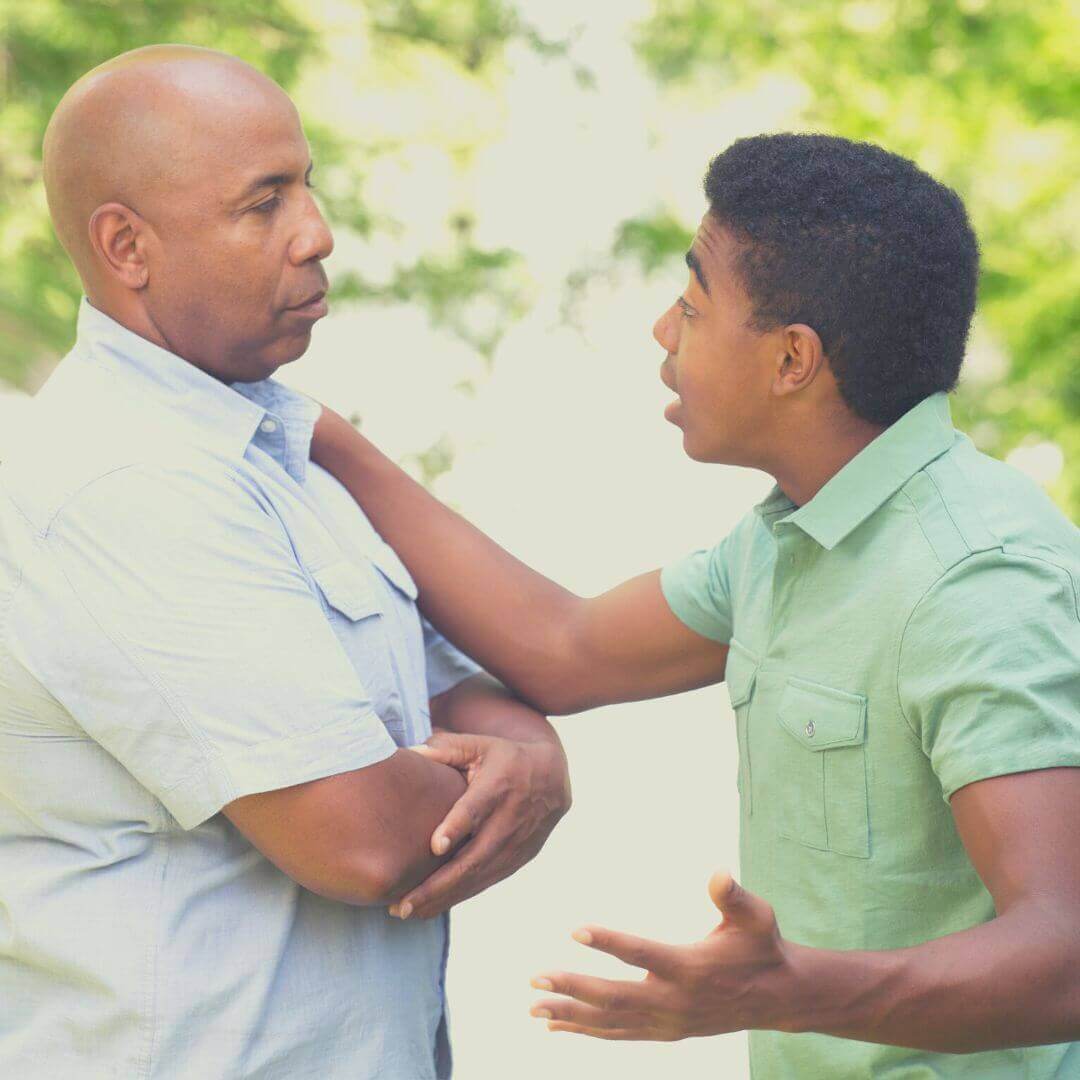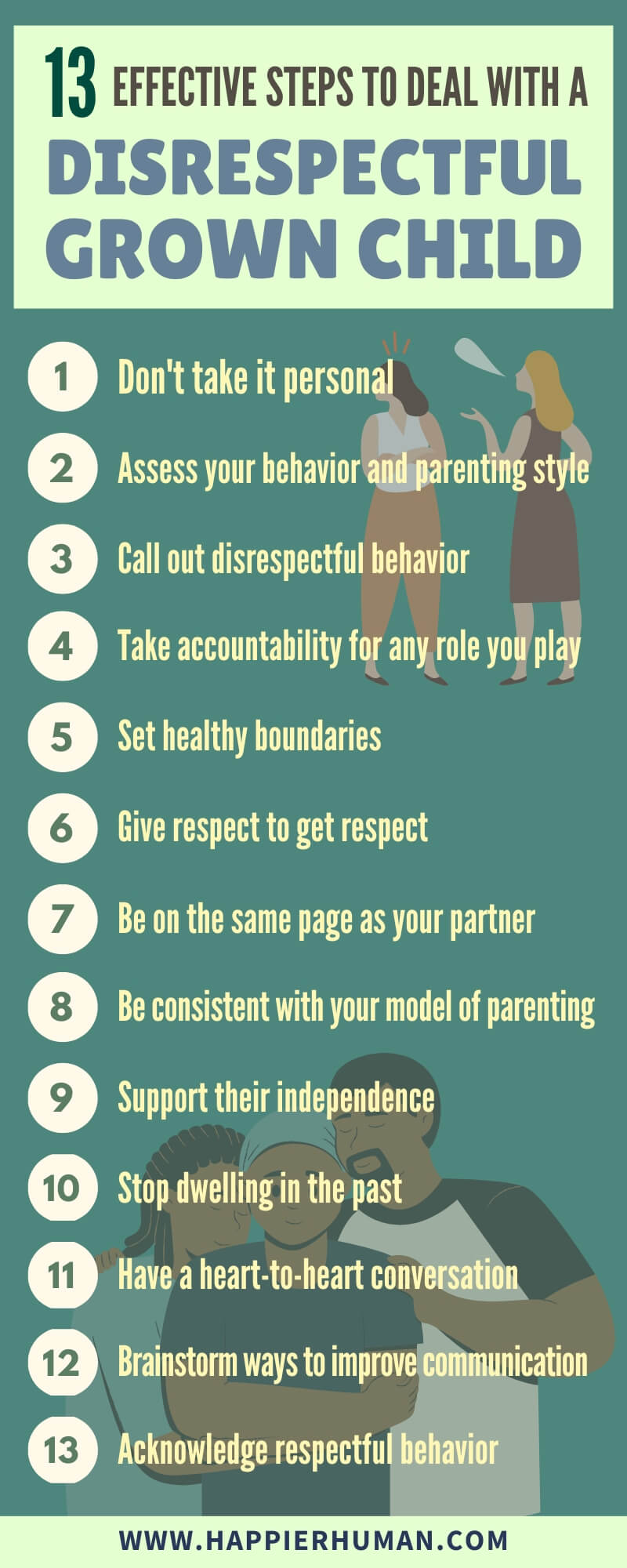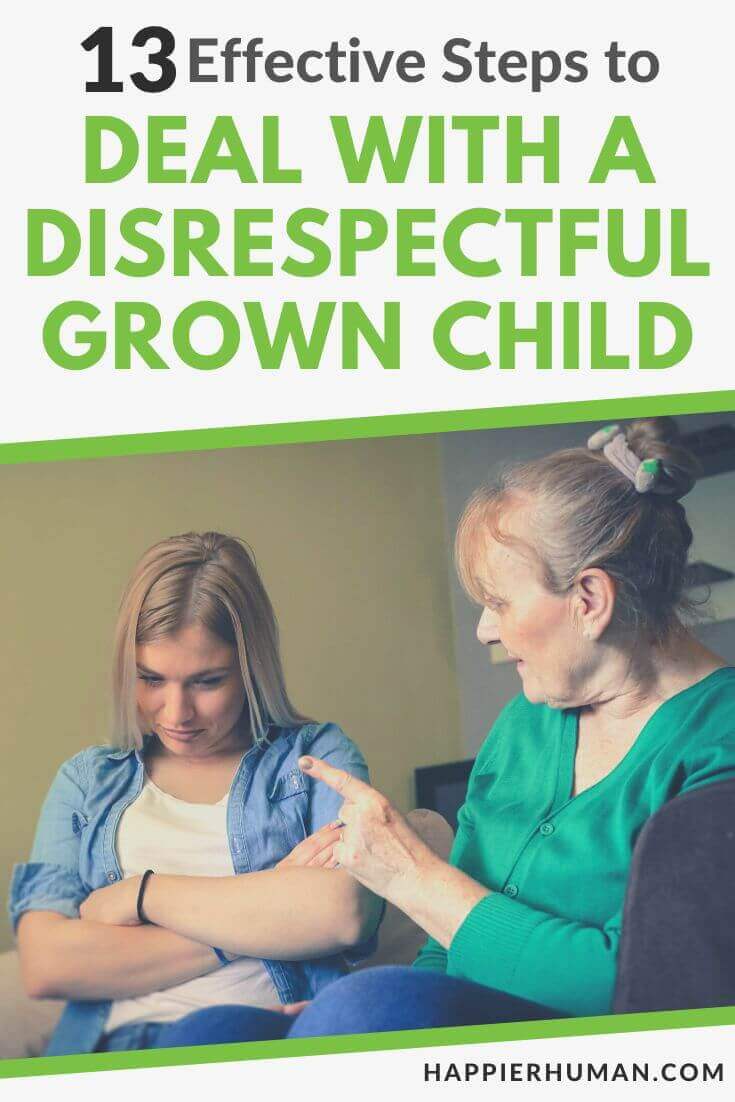Have you had it with your adult child who wouldn't quit being disrespectful towards you and others? A study confirmed that tensions in the relationship between parents and grown children are everyday.
The child's opinion often drives the situation that they can disregard manners and household rules as adults.
I'm sure you would agree that this attitude brings out a lot of mixed emotions, from feeling disappointed and frustrated to sad and hurt. Some days, you may feel like giving up.
What if I told you that knowing how to deal with a disrespectful grown child can change the game? First, we'll go over the signs and causes of the behavior. Next, we'll look at how the 13 steps outlined can help you deal with the situation objectively and improve compliance and respect.
What Does it Mean to be Disrespectful?
Disrespectful (rudeness, discourteous, or insolence) is an attitude that conveys disregard for others, rules, and authority. A lack of courtesy from a grown child can also come from breaking boundaries, devaluing people, refusing to listen, interrupting, or being dismissive.
Potential reasons behind your child’s disrespectful behavior
Without blaming anyone, taking a moment to assess the possible reasons your child is acting out is helpful. Pinpointing the root cause of their actions is the first step to finding helpful solutions. Some come down to learned behavior from parents, peers, or social media.

Other factors include parenting style, mental health problems, substance use, and unresolved childhood trauma. Distress or trouble regulating emotions as they navigate the difficulties of adulthood can also contribute to rebelliousness.
To find out if you're the source of the problem, ask yourself these two key questions:
Possible consequences of ill manners
Your contribution, if any, to the problem doesn't make you a so-called “bad” parent. As parents, we do our best, but we still make many mistakes while raising our children. What matters is awareness and seeking tips on how to deal with a disrespectful grown child. Here's why.
Discourtesy is bound to ignite arguments and chaos within the home, and it doesn't stop there. Your child might disrespect their peers, teachers, and other people they come into contact with. They may get into trouble with authority figures or the law because of it.
Signs You May Be Raising an Insolent Child
Here are some of the many things disrespectful grown kids say and do:
Getting a grip on how to deal with a disrespectful grown child is key to preventing things from spiraling out of control.
13 Steps to Deal with a Disrespectful Grown Child
A lack of respect doesn't always mean something is wrong with your child. Sometimes, it's a “cry for help,” but the child is unable to articulate that need. Fortunately, there are ways to handle the situation.
These steps aren't about self-blame, pointing fingers, avoiding accountability, or taking draconian measures to teach your child a lesson. They're about focusing on the bigger picture and encouraging healthy communication between you and your child. The tips are also useful for rebellious adolescents, tweens, and teens.
#1. Don't take it personal
Children can grow up rude even after receiving your utmost care and attention. They can come across as impolite when expressing frustration or disappointment. Sometimes they try to share their opinions or convey their feelings about something. They may lash out if they notice you aren't listening or taking them seriously.
They also tend to get condescending to protect themselves from parental criticism.

You know your child, and you must try and determine why they're acting this way. What are they trying to communicate? I'm not saying you should tolerate it. However, show empathy. Try to understand where they're coming from instead of thinking the intent is to show utter disregard.
#2. Assess your behavior and parenting style
Getting the hang of dealing with a disrespectful grown child requires us to take a hard look at our behavior and adjust our parenting style. Are you an authoritative, authoritarian, permissive, neglectful, controlling, manipulative, or abusive parent? Ask yourself if your parenting technique is causing more harm than good.
We honestly can't be mad if our child grows into a disrespectful adult after being on the receiving end of our anger, yells, expletives, name-calling, and downright demeaning behaviors.
Parenting can be intensely stressful, but it doesn't give us the right to treat them this way. Even when done unintentionally, the effects of bad parenting remain the same.
#3. Call out disrespectful behavior
In addition to calling out yourself for parenting missteps, you should bring your child's insolent behavior to their attention. They may believe nothing is wrong with their mannerisms toward you, your spouse, or their siblings until you check them.
Practice calling them out immediately instead of remaining silent and then exploding when you can't take it anymore. It's challenging to communicate in a healthy way when you're upset. After checking destructive behaviors, let your child know what consequences will follow.
#4. Take accountability for any role you play
The need to maintain superiority over your child might stop you from accepting your role. However, this step is essential for restoring trust and improving their relationship.
What may have looked like care and protection of your child might have been emotionally damaging.
I get it. I'm a parent, too, and I've made my fair share of mistakes thinking I was approaching things correctly. But my adult child, who I taught to be assertive, brought my behavior to my attention.
The harm is often done unintentionally, but that doesn't absolve us from blame.
#5. Set healthy boundaries
Disagreements between you and your grown child are inevitable. They have a mind and may hold different opinions just like other adults. Establishing healthy boundaries can encourage them to share their views and feelings respectfully. Boundaries are necessary for creating healthy, trusting, and respectful relationships.
Go over the rules with your child during an open discussion. Explain why the boundaries are being set. Let them know you trust them to honor the rules. Assure your child the boundaries are designed to promote mutual respect in communication and behavior.
You can take things a step further and outline appropriate and reasonable consequences for when boundaries are breached. Loss of driving privileges and internet use are two examples of consequences.
#6. Give respect to get respect
Family and relationship experts believe that modeling respect is the best way to teach children respect. This approach is a stark difference from demanding it. “Hey, you have to respect me. I'm your mother!”
That's an example of authoritarian parenting and is the opposite of permissive parenting. It's a strict approach often involving threats, intimidation, and punishment to obtain respect and maintain control.
According to Good Therapy, win your child's respect by seeing them as equally deserving of it instead of coercing them into compliance. Acknowledge and respect their opinions, feelings, and boundaries. Speak respectfully and let go of the “Don’t do as I do, do as I say” mentality.
#7. Be on the same page as your partner
Parenting in unity is crucial for avoiding parenting double standards. To the very least, it confuses children as to which rules to follow and which ones to ignore. Talk with your partner if you notice you're not in agreement on rules, boundaries, and consequences.
Try to come to an understanding of how you'll approach parenting in a way that creates certainty for your child.

Children don't hesitate to manipulate the situation when parents are divided on rules, roles, and expectations. They'll misbehave in the presence of the lenient or permissive parent and “toe the line” when dealing with the authoritarian parent. Conquer disrespect by working as a team.
#8. Be consistent with your model of parenting
Consistent parenting means being firm about your child's manners, upholding rules, and respecting boundaries.
Being firm one day and lax the next causes children not to take you seriously. They may even think you're weak, lose respect, or exploit those loopholes.
I'll admit that I've struggled with consistency and paid the price for it. I tend to let my kids slide, especially when I'm stressed or tired.
I honestly don't set out to confuse them, but when I'm tired, it's challenging to parent appropriately. Do you feel and parent this way sometimes?
#9. Support their independence
If you're a controlling parent, you might unknowingly stifle your child's emotional growth and independence. Always trying to help or intervene and fix things for them doesn't help their development and ability to function independently. This can cause your child to become resentful and lash out.
It comes across as disrespectful to you when it's their way of saying, “I'm an adult now. Stop interfering and controlling my life.”
I know it's hard to let go of your “baby.” It's also normal to worry about their well-being and feel the need to be their “crutch.” Always trying to be their savior can create co-dependency.
You have to free them and trust them to navigate life independently. Offer help, love, support, and empathy, but don't enable them.
Allow them to learn from their own mistakes and grow from there. I promise you, they'll resent you or begin showing insolence if they feel you're standing in their way.
#10. Stop dwelling in the past
Whatever happened between you and your child is now in the past. Quit reminding them of their disobedience and lack of respect. Stop with the negative self-talk and beat yourself up over where you went wrong as a parent.
If you are like me, parenting was a process of trial and error and gaining wisdom along the way. I learned from my mistakes.
It's time to take a forward-thinking approach and apply wisdom to improve your interactions with your adult kid. Listen, show compassion and respect, let go of control, forgive, and focus on building a healthier relationship from here on out.
#11. Have a heart-to-heart conversation
Choose a good time to talk. Be gentle and respectful when broaching the topic. You can say something like, “I’d like to discuss something that's on my mind. Is now a good time to talk?”
Tell your child what you've observed, thought, and felt and how their behavior affects you. Be open and allow them to take turns sharing their thoughts and feelings without interrupting.
Now is a good time for both of you to take accountability for any action contributing to the problem. Having an open chat and owning up can help to repair the relationship, increase trust, and foster closeness. Showing this type of humility might even inspire your child to apologize and respect you more.
#12. Brainstorm ways to improve communication
As parents, we tend to forget or fail to acknowledge that our kids are grown and need to be treated as such. Communication has to be age-appropriate, and we must never talk down to our kids.
Now that they're adults, we should approach communication the same way we interact with our friends or other adults.

Improving your communication skills will help minimize the use of conflict words and can encourage your child to mirror your new mode of interaction. Additionally, you can share mindful communication skills with your child through books, articles, and videos.
#13. Acknowledge respectful behavior
Parenting is a delicate balance of teaching, consequences, and validating good behavior. Make it a habit to look for and applaud positive changes in your child's behavior toward you and others.
For example, instead of calling his sister derogatory names, your son respectfully told her he wasn't happy with something she did.
That's an example of communicating his feelings positively and respectfully. Openly recognizing their good deeds is another effective way to encourage behavioral changes.
Final Thoughts on How to Deal with a Disrespectful Grown Child
Dealing with an unmannerly grown child living at home or on their own can cause distress and leave you with a trail of negative emotions. Feeling bad, self-loathing, or showing aggression towards your child isn't help.
Parenting is a stressful job, no doubt. However, respect is a two-way street. Approaching the situation in a mature, loving, kind, supportive, and respectful will likely encourage a change in the status quo. Is it time for another parenting piece?
See more posts about parenting older grown-up children and teens:
- How to Stop Enabling Your Grown Child
- 19 Best Board Games for Teens & Young Adults
- 17 Mindfulness Activities and Exercises for Teens
- 9 Steps to Stop Worrying About Your Grown Child
- How Parents Can Help Their Teen Overcome Anxiety
- 6 Steps to Write a Letter to a Daughter Who is Disrespectful (Example)


